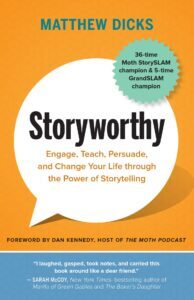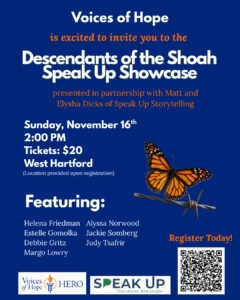Matthew Dicks's Blog
November 20, 2025
An interesting title choice
Exciting news!
My book, “Storyworthy,” is being published in Czech.
My books have been translated into more than 25 languages, but this is a new one for me.
According to the publisher, the English title can’t be translated into a single word, so they have proposed a new title:
Ať vám visí na rtech
This translates to:
“They Will Hang On Your Lips”
I assume they know what they’re doing.

November 19, 2025
Staying in the game
Last night, I was speaking to a storyteller at The Moth during intermission. I hadn’t seen him tell a story in a while, so I asked why I might see him perform again.
“I’ve been doing this for three years,” he said. “I’ve never won. I’ve told more than a dozen stories, and I’ve never placed better than third. I can’t stand losing anymore.”
My response:
Rejection is part of the game. If you’re playing and competing in any arena, buckle up. Rejection and defeat are coming your way.
“Easy for you to say,” he replied.
He pointed out that I’ve won 62 of these competitions — more than half of the StorySLAMs that I have competed in, plus nine GrandSLAM championships.
“I haven’t won even one,” he said.
I pointed out to him that even though I’ve won a lot, I lose about half the time.
And I’ve lost two-thirds of the championships that I’ve competed in.
That’s a lot of losing to go alongside my winning.
Plus, I point out, I have written four entire books that no one has wanted. A dozen picture books that no one wants. I’ve spent years of my life writing books that will likely never see the light of day.
Yes, I’ve published nine books so far, and a tenth will be published next year, but I’ve also faced a lot of painful rejection in the writing arena, too.
It’s part of the game.
Two examples of this that I love:
As a young, aspiring writer in high school, Stephen King submitted short stories to magazines such as The Magazine of Fantasy & Science Fiction and Ellery Queen’s Mystery Magazine. Every single one came back with a form rejection. Instead of throwing them away, he pinned each rejection slip to a nail on his wall—a visual reminder that he was doing the work, that he was in the game.
By the time he was 14, the nail could no longer support the weight—the stack had grown too thick.
His solution?
Replace it with a spike.
King wouldn’t publish his first novel, Carrie, until he was 27. At the time, he was living in a trailer with his wife and child, struggling to make ends meet. Unable to afford medicine for his sick child.
But he didn’t give up. He kept on writing.
King’s philosophy is a good one:
Rejections aren’t a verdict—they’re proof of progress.Output matters more than approval.Persistence, not talent, is what separates the published from the unpublished.The late Howard Frank Mosher, author of 14 books, once told me that whenever he received a rejection, he would tack it to the side of his barn and “shoot it to smithereens” with his shotgun.
“You should see the side of that barn,” he said. “Completely destroyed.”
Mosher wanted to destroy his rejections so he could symbolically move on. Destroying it as dramatically as he did gave him power over the rejection.
It also made him feel good.
I loved that.
I’m not sure if my storytelling friend will take the stage again, but I hope so. I liken his stories a lot. Audiences like them, too,
Staying in the game is essential.
I finished in third place last night, which is annoying. I loved the winning story, but I loved mine, too. I thought it had a great chance of winning.
It was one of those stories that was incredibly fun to tell.
But the loss won’t slow me down in the slightest. I’ll be back in Boston in a couple of weeks with a new story, and a week after that, in New York City with another. And a week after that, I’ll be on the big stage, competing in another Moth GrandSLAM championships.
Win or lose, I’ll be back.
I’ve been telling stories on Moth Stages since July of 2011. I’ve said 160 stories on Moth stages in four different cities. I’ve probably attended another 160 StorySLAMs, hoping to tell a story only to have my name remain stubbornly in the bag.
I’ve won a lot. I’ve lost a lot.
I’ll always be back.
I’m staying in the game. I hope my friend will, too.

November 18, 2025
Alone and unattached
The percentage of adults who did not live with a spouse or partner increased steadily up through around 2019, now hitting 44 percent.
That seems like a lot of people.
Of course, not all of these people are living alone. You can live with roommates or family members who are not spouses or partners, but over a quarter (27.6%) of all U.S.-occupied households were one-person households in 2020, up from just 7.7% in 1940.
The share of people living alone has increased every decade from 1940 to 2020.
Young people are also far more likely to be unpartnered than any other age demographic, with 88 percent of men aged 18 to 24 and 83 percent of women aged 18 to 24 not having a partner.
Those numbers strike me as astronomically high.
Looking back on my own life and doing quick math, I think I was single for about six percent of my dating and married life.
For about 94% of my life, since the age of 16, I have been romantically attached to another person.
I lived alone for exactly one year, from April 2001 to April 2002.
Otherwise, I lived with my parents and siblings, friends, and my wife and kids.
I’m not sure if my life represents an outlier in terms of romantic attachments and living alone, but I don’t think so.
Only 12% of men aged 18-24 have a romantic partner at any one time?
And only 17% of women?
Those numbers seem unbelievable to me. I feel like the statisticians calculated poorly, or I’m missing something.
Are young people really so alone? So romantically unattached?
If so, is it what they want?

November 17, 2025
Two new phrases that I like
The good thing about the dumb things that kids say today is that they don’t last long. Memes are born and die quickly in today’s world because of social media. Rather than needing to spread via human contact, person to person, a phrase like “six-seven” spreads like wildfire, but like a wildfire, most burn out quickly and have no lasting impact.
They are too quickly replaced by something else.
In fact, they burn out so quickly that they often go from popular to cringe overnight.
Want to annoy a young person?
Use a phrase that was popular six months ago as if it were still in use today. Not only will they find it cringy, but they will likely deny ever using such a word, which both you and they will know is false.
Or tell them about the genesis of a phrase they use but don’t quite understand.
“Riz,” for example, is very popular these days (but could become cringy by Wednesday). It’s short for “charisma,” and that’s precisely what it means. However, none of my students were aware of the connection between the two words, so when I pointed it out to them, they denied it.
The thought that I might know more about their youth culture than they do was appalling to them.
The thought that their new word might have its origin in a real word (and not their own innate creativity) was unthinkable.
But two of these new words and phrases that Charlie has used that I like a lot are these:
Charlie calls Elysha “a spawn point.”
If you’re not familiar with gaming, a spawn point is the place in a game where a character enters—either for the first time or following a death. It’s a term that has existed for as long as video games have existed, but I’ve never heard it used to describe a real-world situation before.
Elysha is Charlie’s spawn point:
The place where he entered the game.
I like this a lot.
Charlie also refers to boring people as NPCs, which is an acronym for “non-player character.” This acronym has existed for decades. I first encountered it when playing Dungeons & Dragons in middle school, but Charlie uses it to describe anyone lacking personality, motivation, or purpose.
I like this a lot, too.
I hope these have staying power, but it’s not likely. My generation — Gen X — popularized words like chill, dude, gnarly, bogus, and whatever, which are still used today. We also used phrases like “going postal” and “Don’t have a cow,” which can still be heard in today’s lexicon.
Because we didn’t have the internet or social media, these things spread slowly, person to person, like a virus, and therefore, they became more entrenched in the lexicon.
We had fewer options.
Of course, we also used phrases like “Gag me with a spoon” and “Talk to the hand,” which happily died a quiet death.
But kids today are exposed to an enormous amount of information coming from an unfathomable number of sources, so they pick up and drop new language almost overnight.
What will last? I don’t know. However, I’ll do my best to keep ‘spawn point’ and ‘NPC’ in use for as long as possible.
It will likely drive my students crazy.

November 16, 2025
Arturo Sandoval’s secret sauce
Elysha, Charlie, and I attended a performance by Arturo Sandoval, the world-renowned Cuban-American jazz trumpeter, pianist, timbalero, and composer, on Friday night at the Hope Center for the Arts in Springfield.
Sandoval plays with a band consisting of about half a dozen musicians, but he is the centerpiece of the performance.
It’s very much Aruturo Sandoval and company.
Charlie plays the trumpet, which is why we went to the concert, and he was not disappointed. Watching one of the greatest trumpet players perform about a dozen feet from you is incredible.
As a trumpet player, it must’ve been even more astounding.
But here is what Sandoval did that impressed me so much:
He infused variety throughout his performance.
Sandoval famously plays the trumpet, but he also plays the piano, the keyboard, and the timbalero throughout the show, too.
He sang a song, even though he acknowledges that he doesn’t have the best voice.
He sang scat, which I don’t ever love, but it was different.
He stopped the music entirely to tell a story.
He cracked jokes.
He even spent a few minutes criticizing rap music for its lack of melody and harmony.
Music, he explained, consists of three parts — melody, harmony, and rhythm — but most rap music is rhythm only, and even that is almost always produced by a machine.
“Most rap musicians couldn’t find middle C on a piano,” he said.
I happen to agree with him when it comes to most rap music. I like music that tells a story. I enjoy melody and harmony. I like verses, choruses, and lyrics I can hear and understand. I enjoy guitars, horns, and honest-to-goodness drums.
Unless I’m dancing, I don’t need the bass vibrating my windows.
But even if I disagreed with Sandoval, he made an argument in the midst of a concert. He stated a bold, possibly controversial opinion and educated me on music in the process.
It was an incredible display of virtuosity and an awareness of how to truly entertain an audience – not just by playing great music, but by offering a variety of elements that made the night constantly feel new and alive.
It’s why, when I perform an evening of stories, I always include some stories about the stories themselves. I squeeze in a little standup. I teach a strategy or two. I perform storytelling improv based upon audience prompts. Sometimes I even do Q&A, which is simply another means by which I can tell jokes and stories while satisfying curiosity.
An evening of five or six stories would be fine, but when you mix in a bit of comedy, some improv, and a lesson or two on storytelling, you can create something more dynamic and interesting.
Arturo Sandoval understands this better than anyone I’ve ever seen perform. He was happy at the prospect of seeing Sandoval perform.
I was thrilled by his actual performance.
If you have a chance to see him perform, do so. You’re in for something far more interesting than a concert.
You’re in for a genuinely entertaining show.

November 15, 2025
FAFO?
I recently heard about the parenting movement known as FAFO, an acronym for ”Fuck Around and Find Out.”
It describes a parenting style that essentially allows kids to experience the natural consequences of their actions without getting too involved.
I have news for parents:
This is not new.
It also doesn’t require a name or an acronym or branding of any kind.
Allowing your child to experience natural consequences is how nearly every Gen X kid was raised.
We were left alone for days or weeks at a time with a container of peanut butter, a loaf of Wonder Bread, and a key tied around our neck.
Those of us who survived are strong beyond measure today.
It’s also how teachers help students learn and how Elysha and I have been raising our kids for the last 16 years.
Many of my friends, too.
Maybe not the Wonder Bread and weeks of isolation, but the theory remains the same:
Let kids make decisions for themselves. Let them make mistakes. Let them learn for themselves.
I’ve been allowing students to experience the natural consequences of not studying, not wearing a coat to recess, eating their entire lunch as a mid-morning snack, and a billion other things for the past 27 years.
Rather than telling a child what to do, allow the child to experience the consequences of their actions.
No better instruction exists.
I can’t tell you how many times I’ve said, “That’s what we call a natural consequence” to a student or one of my own kids when their decision has resulted in discomfort, failure, or rejection.
The chances of them repeating the behavior after a stumble or fall are exceedingly low.
Also, exponentially lower than simply telling a child what to do repeatedly.
It’s a hell of a lot easier, too. Let the world be their teacher. I’ll be standing over here, making good choices and enjoying my life.
The real question is this:
What the hell have parents been doing before this supposedly new FAFO movement in parenting?
Have natural consequences gone the way of the dodo bird for some?
I hope not.
My hope is that this is just a needless, meaningless branding of something that people have already been doing, because as a teacher, I have a vested interest in the effective parenting of the human beings I work with every day.

November 14, 2025
Harvard University on the decline
Harvard University has been consumed by an internal report arguing that grade inflation at Harvard has increased dramatically over the years.
In the 2005-06 school year, 25 percent of all grades were A’s.
In the 2024-25 school year, 60 percent of grades were A’s.
The average time students spent studying has remained relatively constant — 6.08 hours per week in fall 2006 to 6.3 hours as of last spring.
So, Harvard students — but not students at most other colleges and universities in the country — have either become exceedingly smarter and more effective over the last two decades, or, far more likely, Harvard professors are handling their fragile, privileged students with kid gloves.
“An A for you! And an A for you! Everyone gets an A today!”
Either way, Harvard apparently ain’t what it used to be. The once prestigious institution appears to be devolving into a diploma mill for its supposedly talented students and legacy nepo babies.
Some of this might be an exaggeration — but maybe not. Sixty percent is an enormous number of A’s. Either way, I like to poke at privilege and pretension whenever possible, and though I know some wonderful, humble, decent people who graduated from Harvard, I also know my share of Ivy League monsters, too.
I was also offered a full scholarship to Yale, which I declined because I needed to continue managing a McDonald’s restaurant in Hartford to support myself financially and wanted to pursue a teaching degree at St. Joseph’s University simultaneously.
Traveling to New Haven every day would’ve been impossible.
I attended Trinity College instead. They, too, offered me a full scholarship.
After years of struggle and trauma, community college was good to me.
However, since I received the scholarship offer from Yale, my allegiance has leaned toward Yale, which is currently not embroiled in a grade inflation scandal, although it still, at times, suffers from insufferability.
Still, Yale’s not handing out A’s like candy, so it’s okay in my book.

November 13, 2025
Speak Up — Voice of Hope storytelling show this Sunday
Speak Up Storytelling and Voices of Hope collaborate for the eighth time on Sunday, November 16, for another storytelling show featuring the children and grandchildren of Holocaust survivors, who will share stories about how their ancestors’ experiences have shaped their lives.
Brilliant, important, unforgettable stories.
I’ve spent the last three weeks listening to these folks share stories from the past and helping them to shape them into compelling narratives filled with heartbreak, hope, and even a little humor.
It’s some of the most important work I do:
Helping people preserve the stories and impact of the Holocaust for future generations.
It’s remarkable how every story in the show is different, and yet the themes that run through all of them are the same:
Hope. Resilience. Bravery.
These are stories you won’t want to miss.
The event will take place in West Hartford, starting at 2:00 PM on Sunday, November 16, 2025.
And fear not, Patriots fan. Our beloved team plays on Thursday night this week, so you won’t be missing the game.
Guess who chose this particular Sunday for the show?
I have my priorities.
The specific location for the show will be provided upon registration.
The cast features:
Helena FriedmanEstelle GomolkaDebbie GritzMargo LowryAlyssa NorwoodJackie SombergJudy TsafrirHosted by Elysha Dicks

November 12, 2025
Asians is a terrible way to characterize people
Four years ago, I had four Vietnamese boys in my classroom. During one of our many conversations about race, they expressed frustration over being referred to as Asian.
Or even Southeast Asian.
As they rightly pointed out, their culture has almost nothing in common with the other nations that comprise Asia or even Southeast Asia.
Vietnam, they explained, is nothing like Japan, India, Mongolia, Russia, or Iran, yet all of these countries — and many more — are located in Asia. It’s not uncommon to refer to the race of people living in many of these countries as Asian.
But Asia is a big place. Referring to someone as Asian doesn’t say much about them in terms of culture or history.
Saying someone is Southeast Asian doesn’t narrow things down very much, either. Eleven nations make up Southeast Asia:
Brunei, Myanmar, Cambodia, Timor-Leste, Indonesia, Laos, Malaysia, the Philippines, Singapore, Thailand, and Vietnam.
I asked my students how they would describe their race, and they all said, “Vietnamese.”
It made a lot of sense.
Yesterday, I was speaking to someone who mentioned that both sides of their family are of Asian descent.
“Where in Asia did your family originate?”
“Malaysia,” she said. “Why?”
I explain those boys’ thoughts on being referred to as Asian, and how, since I taught them (and they taught me), I try to ask where someone’s country of origin is if they mention that they are Asian, since “Asian” is a silly way to describe anyone.
She likes this idea a lot and thanks me. “I never thought of it that way before,” she says.
“Don’t thank me,” I tell her. “It wasn’t my idea. Thank four Vietnamese boys who taught me.”
Kids are smart.
Sometimes they do incredibly stupid things, but adults do stupid things, too. Sometimes more often than kids.
But kids have fresh eyes on the world, and many times, they can see what we cannot if we’re wise enough to listen to them.
I’m happy I was listening to those boys that day.

November 11, 2025
A million miles of fun
If you’re familiar with the song “Steal My Sunshine” — the 1999 hit by Canadian rock band Len, you might be aware of these three brilliant, perfect, tragic lines:
And of course, you can’t become
If you only say what you would have done
So I missed a million miles of fun.
I know so many people who are living this tragic reality.
So many people who talk about doing something, but instead of taking action, they only think about it, discuss it, plan it, and dream about it, but they never actually do it.
I hate it so much. It breaks my heart to watch them move through life, allowing the years to pass and their dreams die a slow, agonizing, irreversible death.
Lots of things stand in their way, but it often boils down to one thing:
Fear.
Fear of risk and change and uncertainty and failure.
As a result, as Len says, they fail to become. They miss a million miles of fun.
A million miles of fun is a lot of fun to miss.




